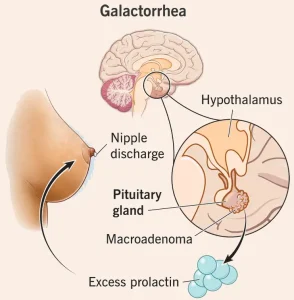Overview
Diagnosing Galactorrhea
Finding the underlying cause of galactorrhea can be challenging due to the many possible reasons it may develop. Your healthcare provider will typically perform a combination of tests and examinations to determine what is causing your nipple discharge.
During a physical exam, your healthcare professional may gently squeeze the area around your nipple to collect some fluid for examination. This exam also includes checking for breast lumps or areas of thickened breast tissue that could indicate other conditions.
A blood test measures your prolactin level, as elevated prolactin is often associated with galactorrhea. If your prolactin level is high, your healthcare provider may also check your thyroid-stimulating hormone level to see if a thyroid problem is contributing to your symptoms.
Since pregnancy is a common cause of nipple discharge, a pregnancy test may be performed to rule this out. If your physical exam reveals a breast lump or other changes to your breast or nipple, your healthcare provider may recommend diagnostic imaging such as a mammogram, ultrasound, or both.
If blood tests show elevated prolactin levels, an MRI of the brain may be ordered to check for a pituitary gland tumor or other issues affecting this gland, as the pituitary controls prolactin production.
Treatment Options for Galactorrhea
Treatment for galactorrhea focuses on addressing the underlying cause. The specific approach depends on what is found during your evaluation.
If your galactorrhea is caused by a medication you are taking, your healthcare provider may recommend stopping the medicine, adjusting your dose, or switching to a different medication. Never change or stop your medications without guidance from your healthcare professional.
For hypothyroidism, thyroid replacement therapy with a medication like levothyroxine helps your thyroid gland produce adequate hormones and often resolves the galactorrhea.
If a pituitary tumor is causing elevated prolactin levels, treatment may include medication to shrink the tumor or surgery to remove it, depending on the specific situation.
In cases where no specific cause can be identified, your healthcare provider may recommend medications that block the effects of prolactin or lower your body’s prolactin level. Bromocriptine and cabergoline are commonly prescribed for this purpose and can help reduce or eliminate milky nipple discharge. Common side effects of these medications include nausea, dizziness, and headaches.
In some cases, if your healthcare professional cannot find an exact cause but your nipple discharge bothers you, treatment may still be offered to help alleviate your symptoms and improve your quality of life. Your healthcare provider can discuss which treatment option is most appropriate for your situation.
Advertisement

